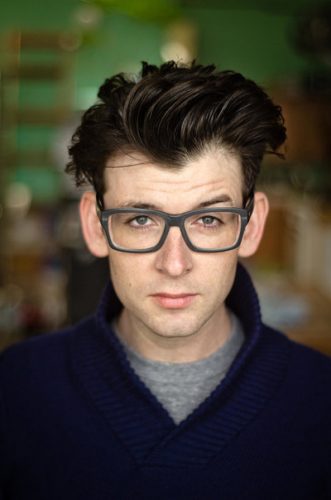
“I couldn’t believe how stupid I was,” writes comedian Moshe Kasher in his new memoir Kasher in the Rye: The True Tale of a White Boy from Oakland Who Became a Drug Addict, Criminal, Mental Patient, and Then Turned 16 (allusions to the Salinger teen-angst classic fully intended). Kasher brings his act to WOW Hall April 17.
“It seemed like, in the face of the most obvious answers in the world,” he continues, “I always chose the dumbest thing to do. It was like I wasn’t in control of my own brain.”
The book (Grand Central Publishing, 2012, $11.99) recounts the comedian’s first 15 years of life: time spent abusing substances, getting in trouble with the law, living the life of a fledgling gangster and dropping in and out of school and rehab — all set to the soundtrack of ’90s-era gangsta rap.
Kasher is Jewish and the child of deaf parents. When his folks split, his mother moved Kasher to the mean streets of Oakland. His father stayed in Brooklyn, immersing himself further in religion and marrying into the fundamental Jewish sect of the Satmars.
Writing of his native religion, Kasher’s edgy and controversial humor is strongest. “The Satmars are among the oddest and most insular of all the Chassidic groups,” Kasher notes. “Of all the Yiddish-speaking, society-rejecting, gown and fur-hat-wearing Chassidic groups, the group my father married into was the most bizarre … It would be like being among the fattest groups of Walmart shoppers.”
In Oakland, Kasher builds a second family of young outcasts and criminals, all of whom heal the pain of broken homes and social anxiety with drugs and alcohol. Kasher effectively conveys the inner turmoil leading to addiction. “If you start low and you get high, you make it to normal for the first time,” he writes.
Long passages of Rye are crass and explicit, Hunter S. Thompson-esque trips through the mind of a stoned and drunk teenager: getting himself into increasingly outrageous and risky situations, moving from borderline delinquent to serious criminal.
Kasher’s memories are energetic and enthusiastic — laugh-out-loud funny but never glorified. The adults in his life seek to help, but by and large society fails Kasher, who is diagnosed with everything from ADD to depression — a junior sociopath in training.
But unlike a true sociopath, Kasher knows he’s a “fuck up,” well aware he’s deeply wounded and causing his mother and grandmother great pain. Like many teens, he considers adults the enemy. “It wasn’t until I was an adult that I looked at my mom and the shock of crow’s feet cracking her face,” Kasher remembers, “and I wondered if I’d caused them.”
Writing vividly of what drives someone to substance abuse, Kasher also eloquently conveys the external and internal forces that can turn around a life. “The doomsday clock was ticking on my ability to defend how I was living,” Kasher remembers. “Perhaps I was growing up.” He recalls comforting words from his grandmother: “You aren’t a bad kid; you just act a lot like one sometimes.”
It isn’t until his mother hires a sign language interpreter, also a recovering addict, that someone levels with Kasher — man to man, adult to adult — and he is able to finally pull himself together, the only one who could save himself.
The UO Cultural Forum presents Moshe Kasher with Barbara Holm and host Gina Ginsberg 8 pm Thursday, April 17, at WOW Hall; $8 adv., $10 door students, $15 general. See Ginsberg’s Q&A with Kasher.